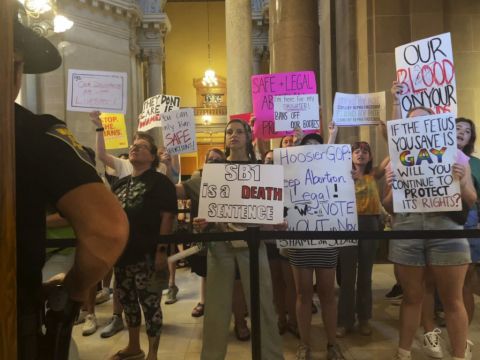Indiana has become the first state in the US to pass new legislation restricting access to abortions since the US Supreme Court overturned Roe v Wade.
The ban, which takes effect on September 12th, includes some exceptions. Abortions would be permitted in cases of rape and incest, before 10-weeks post-fertilisation; to protect the life and physical health of the mother; and if a fetus is diagnosed with a lethal anomaly.
Victims of rape and incest would not be required to sign a notarised affidavit attesting to an attack, as previously proposed in the Senate.
Under the bill, abortions can be performed only in hospitals or outpatient centres owned by hospitals, meaning all abortion clinics would lose their licences. A doctor who performs an illegal abortion or fails to file required reports must also lose their medical licence — wording that tightens current Indiana law that says a doctor “may” lose their licence.

“I am personally most proud of each Hoosier who came forward to courageously share their views in a debate that is unlikely to cease any time soon,” governor Eric Holcomb said in the statement announcing that he had signed the measure.
“For my part as your governor, I will continue to keep an open ear.”
His approval came after the Indiana Senate approved the ban 28-19 and the House members advanced it 62-38.
Indiana was among the earliest Republican-run state legislatures to debate tighter abortion laws after the Supreme Court ruling in June that removed constitutional protections for the procedure. But it is the first state to pass a ban through both chambers, after West Virginia lawmakers on July 29th passed up the chance to be that state.
“Happy to be completed with this, one of the more challenging things that we’ve ever done as a State General Assembly, at least certainly while I’ve been here,” Senate president Pro-Tem Rodric Bray told reporters after the vote.
“I think this is a huge opportunity, and we’ll build on that as we go forward from here.”
Some senators in both parties lamented the bill’s provisions and the impact it would have on the state, including low-income women and the health care system. Eight Republicans joined all 11 Democrats in voting against the bill, though their reasons to thwart the measure were mixed.
“We are backsliding on democracy,” said Democratic senator Jean Breaux of Indianapolis, who wore a green ribbon on Friday signifying support for abortion rights, on her lapel.

“What other freedoms, what other liberties are on the chopping block, waiting to be stripped away?”
Republican senator Mike Bohacek of Michiana Shores spoke about his 21-year-old-daughter, who has Down syndrome. Mr Bohacek voted against the bill, saying it does not have adequate protections for women with disabilities who are raped.
“If she lost her favourite stuffed animal, she’d be inconsolable. Imagine making her carry a child to term,” he said before he started to choke up, then threw his notes on his seat and exited the chamber.
Republican senator Mike Young of Indianapolis, however, said the bill’s enforcement provisions against doctors are not stringent enough.
Such debates demonstrated Indiana residents’ own divisions on the issue, displayed in hours of testimony lawmakers heard over the past two weeks.
Residents on all sides of the issue rarely, if ever, supported the legislation, as abortion-rights supporters said the bill goes too far while anti-abortion activists expressed it does not go far enough.
The debates came amid an evolving landscape of abortion politics across the country as Republicans face some party divisions and Democrats see a possible election-year boost.







